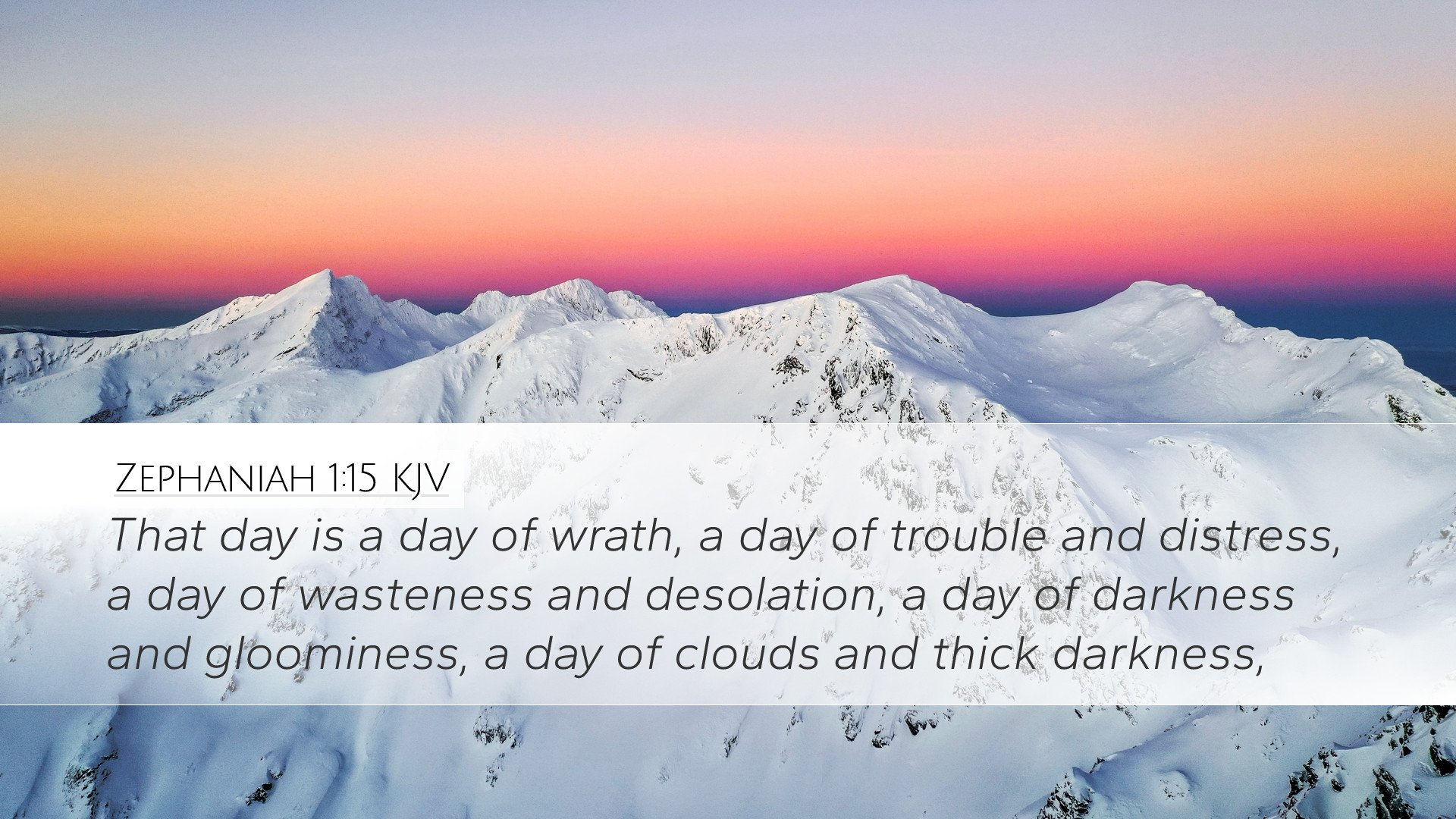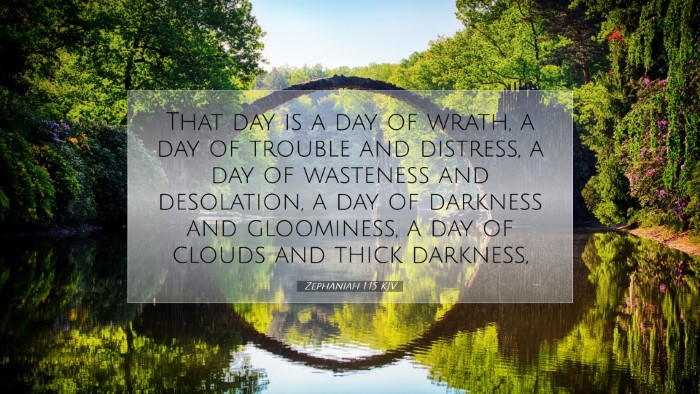Old Testament
Genesis Exodus Leviticus Numbers Deuteronomy Joshua Judges Ruth 1 Samuel 2 Samuel 1 Kings 2 Kings 1 Chronicles 2 Chronicles Ezra Nehemiah Esther Job Psalms Proverbs Ecclesiastes Song of Solomon Isaiah Jeremiah Lamentations Ezekiel Daniel Hosea Joel Amos Obadiah Jonah Micah Nahum Habakkuk Zephaniah Haggai Zechariah MalachiZephaniah 1:15
Zephaniah 1:15 KJV
That day is a day of wrath, a day of trouble and distress, a day of wasteness and desolation, a day of darkness and gloominess, a day of clouds and thick darkness,
Zephaniah 1:15 Bible Commentary
Commentary on Zephaniah 1:15
Verse: "That day is a day of wrath, a day of trouble and distress, a day of wasteness and desolation, a day of darkness and gloominess, a day of clouds and thick darkness."
Introduction
In Zephaniah 1:15, the prophet vividly describes the nature of the coming day of the Lord, characterized by divine wrath and impending judgment. This verse captures the essence of eschatological themes prevalent in both the Old and New Testaments, inviting deeper reflection from pastors, students, theologians, and Bible scholars on the severity of God’s judgment as well as His overarching purpose for His people.
Contextual Overview
This prophecy is situated within the context of Zephaniah's warning to Judah during the reign of King Josiah. The nation was steeped in idolatry, and Zephaniah calls for repentance. This verse serves as both a warning to Judah and a wider announcement of God's judgment on the nations.
Relevance of The Day of the Lord
- Judgment & Accountability: The term "that day" suggests a specific time of reckoning wherein God’s judgment becomes apparent. According to Matthew Henry, this prophecy calls attention to the accountability of nations before God.
- Wrath and Distress: Albert Barnes points out that the descriptions evoke a sense of fear and urgency, compelling both the Israelites and us today to understand the serious implications of turning away from God.
- Theological Implications: Adam Clarke emphasizes that the day signifies a climax of God’s long-suffering patience. This inevitability should lead to introspection on the state of our relationship with God.
Exegesis of Key Phrases
“Day of Wrath”
Henry explains that the "day of wrath" uniquely frames God’s nature as both just and holy. This phrase conveys the seriousness of God’s anger against sin and rebellion. It signifies a time when God will confront wickedness directly.
“Trouble and Distress”
Barnes elaborates on these terms as indicators of the multi-faceted effects of judgment that extend beyond mere physical destruction. They embody emotional and spiritual anguish as the people experience the withdrawal of God’s protective presence.
“Wasteness and Desolation”
Clarke reflects on the imagery of wasteness, noting it presents not just physical ruins but also the spiritual desolation resulting from a life turned away from God. It serves as a warning for those who neglect their spiritual obligations.
“Darkness and Gloominess”
The metaphoric use of darkness portrays spiritual ignorance and the absence of God’s light, as noted by Henry. It signifies a time of confusion where truth becomes obscured, further complicating the ability for repentance and turning back to God.
“Clouds and Thick Darkness”
Clarke comments that these images evoke feelings of dread and foreboding, symbolizing not only despair but also the clouds of judgment that obscure hope. Each phrase builds upon the previous, culminating in a stark portrait of divine retribution.
Theological Reflections
The juxtaposition of God's anger with His desire for reconciliation illustrates the tension within divine holiness and mercy. The day of the Lord thus serves as a dual-purpose; it is meant to bring judgment for the unrepentant while simultaneously providing an opportunity for redemption for those who turn back to Him.
The Nature of God’s Judgment
- Holy Justice: This passage encapsulates God’s commitment to justice, which is necessary for His character as just and righteous. His wrath is not arbitrary; it is a response to human disobedience and sin.
- Call to Repentance: The descriptions serve as a solemn call to the faithful, challenging them to repent prior to the ultimate day of reckoning. It provides a vivid reminder of the importance of maintaining an active relationship with God.
Practical Applications
- Self-Examination: This verse invites congregations to engage in self-reflection and assess their spiritual state against God’s Word.
- Urgency in Witness: The prophetic urgency also encourages believers to witness to others about the impending judgment, fostering a sense of urgency in our mission.
- Hope in Christ: Amidst the warnings, the New Testament presents Christ as our hope, who redeems from the impending judgment described in Zephaniah.
Conclusion
Zephaniah 1:15 is a stark reminder of the nature of divine judgment that serves both as a warning and an opportunity for repentance. It compels modern readers to consider the character of God, the seriousness of sin, and the profound mercy offered through Christ. By reflecting on the themes in this verse, pastors, students, and scholars alike can draw foundational truths that underscore both God’s justice and mercy in the narrative of salvation.


